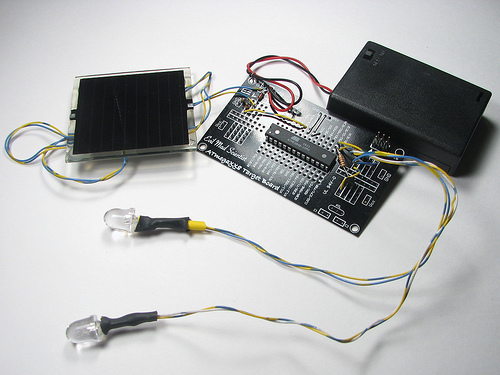Windell Oskay, in his blog, has explained how to affix solar power to small electronics projects instead of using battery powered night lights, garden lights or decorations for Halloween and save money and nature. The device, here, used for accumulating solar device is small solar panel for all of these circuits. The direct drive to use power from a solar panel is to connect the load directly to the output leads of the solar panel.

This type of basic “direct drive” circuits is comfortable with their design function, but doesn’t deliver any energy storage, and is at risk of blinking out when a bird or cloud passes overhead. They are perfect for running a small fan or pump but for powering a microcontroller or other computer, power interruption can be troublesome.
The circuit design with super capacitor acts as a “flywheel” and deliver continuous power during brief interruptions. This solves the interruption problem but generally a capacitor doesn’t offer adequate energy storage to power a solar circuit for prolonged dark periods. Therefore, the need of a rechargeable battery that provides a fairly consistent output voltage acts as suffices. The solar panel of this circuit charges up a 3-cell NiMH battery (3.6 V).
A dark-detecting LED driver circuit which uses an infrared phototransistor is used for detecting darkness. The switching is performed using a PNP transistor, controlled by the voltage output from the solar panel. In sunlight, the panel output is high and it turns off the transistor while in dark, the transistor lets current flow to the yellow LED.
A small AVR microcontroller added to the circuit which is potentially a very low current and acts as a resourceful device that saves power by switching off the LED, when not required. The PWM (pulse-width modulation) output of the microcontroller drives a Joule Thief style voltage booster, which is used for running the white LED.
Check out the following link for more details.
Filed Under: Reviews


Questions related to this article?
👉Ask and discuss on Electro-Tech-Online.com and EDAboard.com forums.
Tell Us What You Think!!
You must be logged in to post a comment.